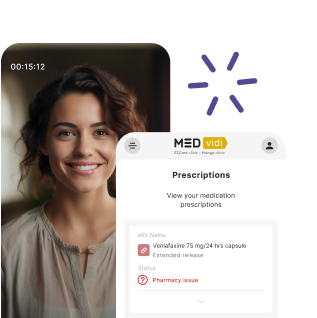Highlights
- Both Focalin and Concerta are approved for ADHD treatment.
- They elevate the levels of dopamine and norepinephrine in the brain.
- They have different chemical compositions, available dosages and forms, the onset and duration of action, and potency.
- Headaches, dry mouth, decreased appetite, weight loss, stomach issues, anxiety, and lack of sleep are a few common side effects.
Attention deficit hyperactivity disorder (ADHD) affects about
In this article, we provide a detailed comparison of Focalin and Concerta. Both medications are approved to treat ADHD, but they differ in chemical components, available forms and dosages, onset and duration of action, and potency. Read on to better understand their therapeutic mechanisms and possible side effects.
Receive ADHD treatment online

What Is Concerta?
What Is Focalin?
How Do They Work?
As stimulant medications, both Concerta and Focalin aid people with ADHD in becoming more focused, attentive, and able to control their impulses. However, they function differently.
Focalin is believed to work by increasing the levels of specific neurotransmitters in the brain, mainly dopamine and norepinephrine. As a result, it decreases inattention and impulsivity in patients with ADHD.
Concerta also increases dopamine and noradrenaline levels in the brain. It provides a calming effect and helps improve concentration, which makes it one of the most popular medications for ADHD treatment.
Do Focalin and Concerta Reduce Anxiety?
Anxiety and ADHD
Neither Focalin nor Concerta are prescribed for anxiety disorders. They can help reduce ADHD symptoms, but if you also have anxiety, your healthcare provider will determine a comprehensive course of treatment to address both conditions.
Common Side Effects
Like any other medications, Concerta and Focalin have several side effects. Potential ones are listed below.
Focalin | Concerta |
|
|
If you experience any adverse reactions that are severe, prolonged or disrupt your daily life in another way, gain medical attention as soon as possible to adjust your treatment.
Similarities of Focalin and Concerta
These medicines are similar in many ways, such as:
- Both are stimulant medications and belong to the same drug class—CNS stimulants.
- They are classified as Schedule II drugs under the DEA classification, which reflects their high risk of abuse and dependence.
- They are available only as oral prescription medications on the recommendation of licensed healthcare professionals.
- They are FDA-approved only for ADHD treatment.
- Their therapeutic effects are based on increasing the levels of dopamine and norepinephrine in the brain.
- They are almost equally effective in managing ADHD, excluding individual response variations.
- Some of their most common side effects include headaches, dry mouth, decreased appetite, weight loss, stomach problems, anxiety, and insomnia.
- Some of their more severe complications include an increased risk of serious cardiovascular events, abrupt increases in blood pressure and heart rate, psychiatric problems, seizures, detrimental effects on blood vessels, visual disturbances, painful and prolonged erections (priapism), and risk of abuse and addiction.
- They can be used during pregnancy and lactation but only in cases determined by doctors where the benefits outweigh the risks of the medication.
Differences Between Focalin and Concerta
Besides many similarities, a few key differences do exist between these medications.
Characteristic | Focalin | Concerta |
Active ingredient | Dexmethylphenidate hydrochloride | Methylphenidate hydrochloride |
Inert ingredients |
|
|
Available forms |
|
|
Available strengths |
| 18 mg, 27 mg, 36 mg, and 54 mg |
Dosage frequency |
| Once daily dosing |
Potency | 2x | 1x |
Onset of action |
| 1-2 hours |
Duration of action |
| 8-12 hours |
Absolute contraindications |
|
|
Clinically important drug interactions |
|
|
Note that dosage frequency, the onset of action, and the duration of effects may vary from one patient to another depending on health specifics and individual response.
Shapes and Colors of Focalin vs Concerta
Immediate-release Focalin tablets are D-shaped and include the following options:
- D 2.5: 2.5 mg, blue.
- D 5: 5 mg, yellow.
- D 10: 10 mg, white.
Focalin XR is available in the form of capsules and has the following colors based on the strengths:
- 5 mg: light blue
- 10 mg: light caramel
- 15 mg: green
- 20 mg: white
- 25 mg: light blue and white
- 30 mg: light caramel and white
- 35 mg: light blue and light caramel
- 40 mg: green and white
Concerta pills are elliptical or oval with imprinted “alza” and dosage:
- Alza 18: 18 mg, yellow.
- Alza 27: 27 mg, gray.
- Alza 36: 36 mg, white.
- Alza 54: 54mg, red.
General Dosage Guidelines
The dosage is determined by the physician and can vary depending on various factors, including age, medical history, side effects, etc. The usual starting dose of Focalin in adults is 2.5 mg twice daily with a maximum dose of 20 mg daily. Concerta’s recommended initial dosage starts at 18 mg or 36 mg per day for adults and can increase to 72 mg daily. These medications should be taken exactly as prescribed, and you should not alter them without consulting your doctor.
The Effectiveness of Focalin vs Concerta for ADHD
Focalin is considered a strong medication compared to Concerta because
How to Obtain a Prescription for Focalin and Concerta
Both medications are Schedule II controlled substances, so they require a prescription from a licensed medical provider. At MEDvidi, you can obtain a prescription based on the following steps:
- Symptom assessment: A healthcare provider will evaluate your condition to determine whether Concerta, Focalin, or other medications are appropriate. If further testing is necessary to comprehend your symptoms fully, they will suggest the course of action.
- Medical history: Be ready to respond to inquiries regarding your past medical experiences and therapies that you may have tried for ADHD management. These include any mental health concerns, previous prescriptions, and current symptoms.
- Regular supervision: If your healthcare provider prescribes Concerta or Focalin, adhere to dosage guidelines and other instructions. Attend follow-up sessions to monitor your health dynamics and modify your treatment plan if necessary.
If any of these medications appear to be appropriate in your particular case, a MEDvidi provider will write a prescription that will be sent digitally to the pharmacy of your choice.
Summing Up
Although both Focalin and Concerta can help manage ADHD, they differ in chemical components, dosage guidelines, and many other aspects discussed in this article. The choice of medication depends on the intensity of your disorder and individual circumstances. We at MEDvidi are ready to assess your health in detail and offer the most suitable personalized treatment plan for ADHD.
Frequently Asked Questions
Do Focalin or Concerta cause brain fog?
These medications can sometimes cause brain fog that causes feelings of cognitive drowsiness and difficulty concentrating. However, not everyone experiences the same side effects.
What are the specific behavioral changes when switching from Concerta to Focalin?
Switching from Concerta to Focalin or vice versa may cause changes in their bodies’ reactions to the medications. Behavioral changes can include alterations in focus, attention, mood, and sleep patterns.
Are there any significant differences in the cost of Focalin and Concerta, particularly for long-term treatment?
These medications might differ in price, especially if treatment is needed for an extended period. The dosage, formulation (e.g., brand name vs generic formulations), insurance coverage, and drugstore pricing can all affect the cost.
What are the guidelines for switching between Focalin and Concerta?
Switching medications should be done with the guidance of a medical provider. They will monitor your response and suggest a gradual transition or adjust the dosage to optimize your response.













